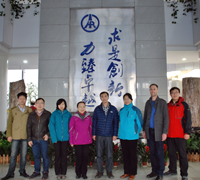
Jun 25, 2014 | News
The Research Institute of Highway (RIOH), Ministry of Transport, China, has received the iRAP Asia Pacific Star Performer award for their leadership of ChinaRAP.
The China Road Assessment Program (ChinaRAP), which Star Rates roads for crash risk and develops safety countermeasure plans, is now being used in 14 city and highway projects across China, helping to shape development bank projects worth more than CNY 9 billion (USD 1.5 billion).
A few examples of ChinaRAP projects are:
- In Yunnan, the team assessed city roads and made recommendations for safety improvements, such as footpaths, speed limit reclassification and bicycle lanes, in the World Bank financed Yunnan Honghe Prefecture Urban Transport Project.
- In Shaanxi, the team is working closely with designers to lift safety star ratings on almost 1,000km of roads as part of the Asian Development Bank financed Shaanxi Mountains Road Safety Demonstration Project.
- In Anhui, the team worked closely with designers of the G316 to lift star ratings of a new class 1 road. These upgrades are funded by the Wuhu Local Government.
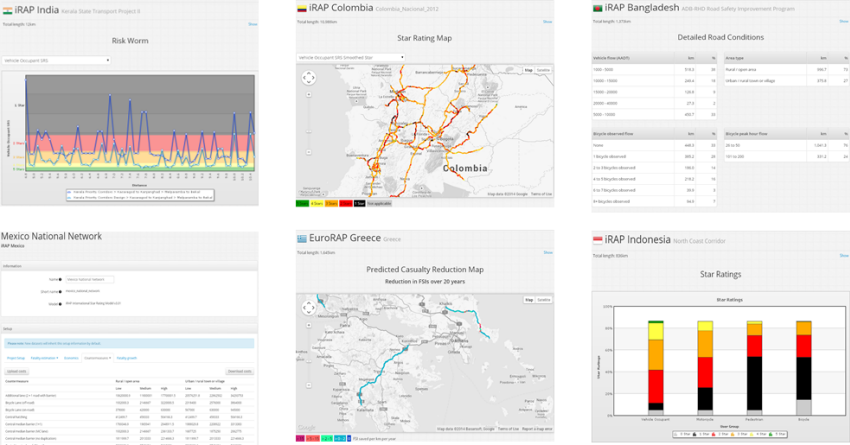
Jun 5, 2014 | Resources
ViDA is the iRAP online road safety software platform. You can use it to create and analyse interactive safety reports for your roads.
Users of ViDA are able to upload road inspection data to produce detailed road condition reports, Star Ratings and Safer Roads Investment Plans. You can also use the Star Rating Demonstrator to quickly check the Star Rating of your road or design.
You can register to use ViDA for free at vida.irap.org.
Watch a video tour of ViDA or download the guide.
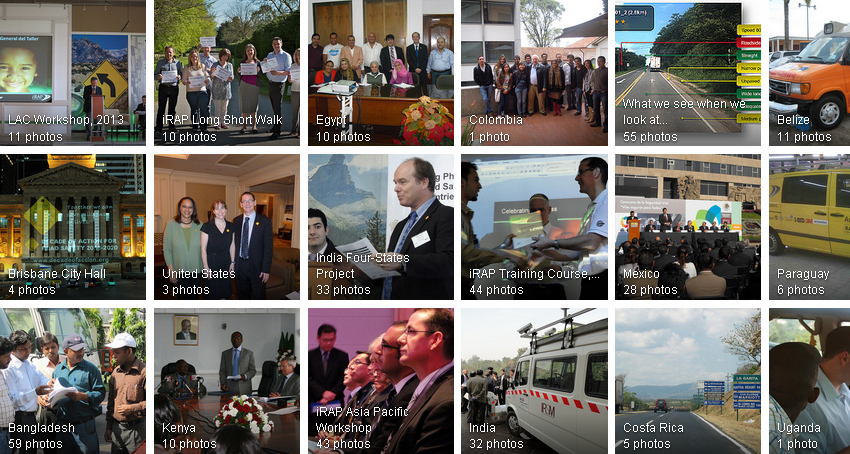
Jun 5, 2014 | Resources
Take a look at our photo library, which includes images of roads and projects from around the world.
Visit our Flickr photo library now.

Jun 4, 2014 | Resources
The Road Safety Toolkit provides free information on the causes and prevention of road crashes that cause death and injury.
Building on decades of road safety research, the Toolkit helps engineers, planners and policy makers develop safety plans for car occupants, motorcyclists, pedestrians, bicyclists, heavy vehicle occupants and public transport users.
The Road Safety Toolkit is the result of collaboration between iRAP, the Global Transport Knowledge Partnership (gTKP) and the World Bank Global Road Safety Facility. ARRB Group provided expert advice during the Toolkit’s development.

Jun 4, 2014 | News
The last rites are being held today for Gopinath Munde, India’s Rural Development Minister who was tragically killed this week in a car crash. Although a very high profile case which has seen much coverage in the Indian press and further afield, he is by no means the only road victim this week in a country struggling to cope with the burden of road crashes. With around 380 reported road deaths each and every day on India’s roads the country is at crisis point and figures show that many of the victims will be the from lower-income rural families, the lives of whom Mr Munde worked so hard to improve, that are the hardest hit.
Fortunately there are positive efforts being made, among them the work being led by Public Works Departments and the World Bank in States such as Kerala, Gujarat, Assam and Karnataka. In major road upgrade projects, ambitious targets to lift road safety star ratings have been set. It’s the first time that this approach, which is lifting designs above basic standards, has been adopted in a developing country on a large scale. Importantly, the targets are aimed at making roads safer for everyone: vehicle occupants, motorcyclists, pedestrians and bicyclists.
The road safety challenge in India is large; but many of the solutions are already well known. Building features such as footpaths, safe crossings, safety barriers and roundabouts around the country will save lives. The death of Gopinath Munde is truly upsetting; we must ensure that thousands more deaths like his are avoided.
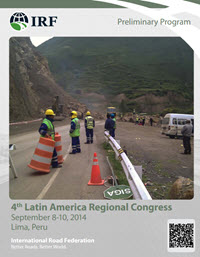
May 29, 2014 | Espanol news
La Federación Internacional de Carreteras (IRF, por su sigla en inglés) llevará a cabo una serie de congresos regionales en África, América Latina y Asia este año.
Los asistentes a las conferencias tendrán la oportunidad de dialogar con funcionarios del gobierno, socios en el desarrollo, contratistas, consultores y otras partes interesadas que comparten el interés común de mejorar las vidas de las personas a través de un sistema de transporte sólido, resiliente y seguro.
Para apoyar en el desarrollo y análisis de políticas viales, también está disponible el IRF World Road Statistics En ocasión del 50 aniversario de la publicación, se incluye 12 años de datos actualizados, lo cual brinda una visión estadística completa del transporte terrestre y vial a nivel internacional desde el inicio del milenio.

May 29, 2014 | News
The International Road Federation (IRF) will hold a series of regional congresses, in Africa, Latin America and Asia this year.
Attendees at the conferences will have the opportunity to dialogue with government officials, developmental partners, contractors, consultants and other stakeholders who share a common interest in improving people’s lives through a sound, resilient and safe transportation system
To support road policy development and analysis, the IRF World Road Statistics is also available. To mark the 50th anniversary of the publication, includes 12 years of updated data, providing a comprehensive statistical picture of international road and inland transport from the start of the millennium.

May 29, 2014 | Espanol news
Facilitado por el Japan Automobile Federation (JAF) y con apoyo técnico del iRAP, el National Institute for Land and Infrastructure Management (NILIM) ha realizado una evaluación piloto del riesgo en las vías de Japón.
Además de ayudar a crear un mayor entendimiento de la metodología del iRAP entre los socios locales, el proyecto también ofrece la oportunidad de que iRAP aprenda de las técnicas en gestión de la seguridad que han resultado exitosas en Japón.
Entre 2001 y 2010, Japón logró reducir a más de la mitad su tasa de muertes en las vías, reduciendo la tasa de 10 muertes por 100,000 habitantes a 4.5 muertes por 100,000 habitantes.

May 29, 2014 | News
Facilitated by the Japan Automobile federation (JAF) and with technical support from iRAP, the National Institute for Land and Infrastructure Management (NILIM) has carried out a pilot assessment of risk on roads in Japan.
Apart from helping to build an understanding of the iRAP methodology among local partners, the project also offers the opportunity for iRAP to learn about successful safety management techniques in Japan.
Between 2001 and 2010, Japan managed to more than halve its road death rate, cutting the rate from 10 deaths per 100,000 population to 4.5 deaths per 100,000 population.

May 28, 2014 | Espanol news
Durante la 12va Asamblea General Anual de EuroRAP, el Institute for Transport Sciences (KTI) publicó los Mapas de Riesgos para cerca de 3,000km de vías en Hungría..
Las vías representan solo 11% de la parte investigada de la red vial nacional, pero soportan 54% del flujo vehicular. Cerca de 34% de las colisiones mortales ocurren en las vías.
El Mapa de Riesgos, elaborado como parte de SENSOR, muestra que la red abarca el rango completo de categorías de riesgo, desde riesgo alto hasta riesgo bajo.
En base a los hallazgos de la revisión realizada con la metodología de EuroRAP, un grupo de expertos de Hungría elaborará propuestas de bajo presupuesto para implementar mejoras en términos de seguridad.

May 28, 2014 | News
During the 12th Annual EuroRAP General Assembly, the Institute for Transport Sciences (KTI) published Risk Maps for some 3,000km of roads in Hungary.
The roads represent just 11% of the investigated part of the national road network, but carry 54% of traffic flow. Some 34% of fatal crashes occur on the roads.
The Risk Map, produced as part of SENSOR, shows that the network spans the full range of risk categories, from high risk through to low risk.
Based on the findings of the review carried out with EuroRAP methodology, a Hungarian expert group is to make proposals on low-budget safety improvements.
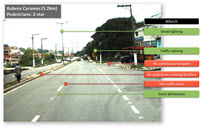
May 28, 2014 | News
In the first application of iRAP in Brazil, crash risk on 4,250km of roads in São Paulo state was assessed.
The results, which are helping to guide the $429 million São Paulo Sustainable Transport Project, were presented as part of a training course for around 150 people.
Much of the network was rated in the highest risk 1- and 2-star categories. About two thirds (62%) of roads where pedestrians are present carry traffic 40km/h or more have no footpaths. Almost half (40%) have hazardous objects within 5 metres of the edge and limited roadside protection (such as safety barriers).
The most comprehensive plan shows that an investment of R$2.55 billion (US$1.28 billion) could reduce the number of deaths and serious injuries by 41%, preventing almost 80,000 deaths and serious injuries over 20 years.
Following the presentation of results, iRAP’s São Paulo based consultant conducted a series of workshops to train 15 engineers and planners from the São Paulo Department of Highways (DER-SP) in the use of the iRAP methodology and software.
The iRAP assessments in Brazil are supported by the World Bank GRSF and Bloomberg Philanthropies.

May 28, 2014 | Espanol news
En la primera aplicación del iRAP en Brasil, se evaluó el riesgo de colisiones en 4,250 km de carreteras en el estado de Sao Paulo.
Los resultados, que están ayudando a orientar el , que están ayudando a orientar el por un valor de $429 millones, se presentaron como parte de un curso de capacitación para cerca de 150 personas.
MGran parte de la red se clasificó en las categorías de riesgo más altas con 1 a 2 estrellas. Cerca de dos tercios (62%) de las vías con presencia de peatones soportan un tráfico de 40 km/h o más y no tienen aceras (veredas). Casi la mitad (40%) tiene objetos peligrosos a 5 metros del borde y protección limitada al lado de la acera (tales como barreras de seguridad).
El plan más exhaustivo muestra que una inversión de R$2.55 mil millones (US$1.28 mil millones) podría reducir el número de muertes y lesiones graves en 41%, y así prevenir cerca de 80,000 muertes y lesiones graves en los próximos 20 años.
Las evaluaciones del iRAP reciben el apoyo del Foro Global de Seguridad Vial del Banco Mundial y Bloomberg Philanthropies.

May 27, 2014 | Espanol news
Expertos en infraestructura vial y vehículos analizaron recientemente la forma en que las tecnologías de sus respectivos campos ‘trabajan juntas’ para prevenir tipos comunes de colisiones de vehículos y motocicletas, y aquellas donde hay peatones y ciclistas involucrados.
Los participantes en el taller, organizado por RACV en Melbourne, Australia, también consideraron el riesgo de prevenir colisiones relacionadas con la flota de ‘bicicletas electrónicas’ que viene usándose cada vez más en muchas partes del mundo.
Si bien la tecnología avanzada V2V y V2I, que puede dar lugar a la implementación de vehículos ‘sin conductor’, se citó como de enorme potencial, también se hizo énfasis en los beneficios para la seguridad del uso rápido y en mayor escala de tecnologías y técnicas que ya han sido probadas, especialmente en países en rápido desarrollo.
Los ejemplos considerados incluyeron: asistencia en frenadas de emergencia que ayuda a los conductores a bajar rápidamente la velocidad de su vehículo, barreras de seguridad flexibles que son altamente costo-efectivas en disipar la energía y formas innovadoras para proteger la cabeza de los ciclistas.
El taller fue desarrollado por iRAP y GNCAP, y se basó en la Roads That Cars Can Read Initiative (Iniciativa de Vías que los Autos Pueden Leer). El ARRB Group actualmente está elaborando un Informe de Investigación que documentará las medidas adoptadas.

May 27, 2014 | News
Vehicle and road infrastructure experts recently explored how technologies from their fields will ‘work together’ to prevent common types of vehicle and motorcycle crashes and those involving pedestrians and bicyclists.
Participants in the workshop, which was hosted by RACV in Melbourne, Australia, also considered the challenge of preventing crashes involving the rapidly growing ‘e-bike’ fleet in many parts of the world.
Although advanced V2V and V2I technology which may lead to ‘self-driving’ cars was cited as having enormous potential, there was also a focus was on the safety gains of rapid, wide-scale deployment of already-proven technology and techniques, especially in rapidly developing countries.
Examples considered include: emergency brake assist which helps drivers to quickly slow their car, flexible safety barriers that are highly-effective at dissipating energy and innovative forms of head-protection for bicyclists.
The workshop was developed by iRAP and GNCAP, and built on the Roads That Cars Can Read Initiative. ARRB Group is currently producing a Research Report that will document proceedings.

May 26, 2014 | Espanol news
TdR estándar y especificaciones técnicas, que pueden usarse en la adquisición y gestión de actividades relacionadas con especificaciones del iRAP, están disponibles en línea.
Los documentos incluyen Términos de Referencia (TdR) estándar que pueden descargarse y editarse para que sirvan de base para un plan de un proyecto y/o utilizarse en el proceso de contratación de consultores para prestar los servicios.
Los documentos también incluyen especificaciones sobre inspecciones viales, análisis de Clasificaciones por Estrellas y Planes de Inversión para Vías Más Seguras y análisis de Mapas de Riesgos usando datos de colisiones.
Las especificaciones vienen acompañadas de una lista de consultores y empresas con capacidad para licitar y ejecutar proyectos siguiendo las especificaciones del iRAP. Las especificaciones también permiten a los consultores y empresas que anteriormente no hayan realizado actividades específicas al iRAP obtener una ‘acreditación’ durante la ejecución del proyecto.

May 26, 2014 | News
Standard iRAP technical specifications, guides and manuals, which can be used in procurement and management of iRAP-specification activities, are available online.
The documents include a standard Terms of Reference (TOR) that can be downloaded and edited to form the basis of a project plan and/or used in the process of engaging consultants to deliver services.
The documents also include specifications on road inspections, Star Rating and Safer Roads Investment Plan analyses and Risk Map analyses using crash data.
The specifications are accompanied by a growing list of consultants and firms capable of bidding for and delivering iRAP-specification projects. The specifications also enable consultants and firms that have not previously undertaken iRAP-specific activities to gain ‘accreditation’ during project delivery.

May 23, 2014 | News
The granddaughter of Nelson Mandela and global road safety campaigner, Zoleka Mandela led the launch of the first Safe Schools project in South Africa.
The project is a pioneering approach, introducing safe road infrastructure to protect school children, combined with road safety education and awareness for children and teachers from Takalani Sesame and Childsafe.
The initial iRAP assessment conducted with the City of Cape Town found that 77% of the roads around Sivile Primary School are in the highest-risk 1- and 2-star categories for pedestrians.
The project is primarily funded with a donation from Decade of Action global corporate supporter Janssen, a Johnson & Johnson company. Additional financing and technical support for the project was provided by WorleyParsons, IVECO, and the FIA Foundation. The Medical Research Council is coordinating the monitoring and evaluation of the project.

May 23, 2014 | Espanol news
La nieta de Nelson Mandela y activista mundial en seguridad vial, Zoleka Mandela, dirigió el lanzamiento del primer proyecto de Escuelas Seguras en Sudáfrica.
El proyecto es un enfoque pionero que introduce los conceptos de infraestructura vial segura para proteger a los escolares, junto con un programa de educación y sensibilización en seguridad vial para niños y maestros de Takalani Sesame y Childsafe.
La evaluación inicial del iRAP realizada con Ciudad del Cabo encontró que 77% de las vías alrededor de la Escuela Primaria de Silvie se encuentran en las categorías de riesgo de 1 y 2 estrellas, que son las más altas para peatones
El proyecto ha sido financiado principalmente por una donación de Janssen, una empresa de Johnson & Johnson, quienes han sido los más firmes defensores de la Década de Acción a nivel mundial. WorleyParsons, IVECO y la Fundación FIA brindaron financiamiento adicional y apoyo técnico. El Consejo de Investigación Médica está coordinando el monitoreo y la evaluación del proyecto.
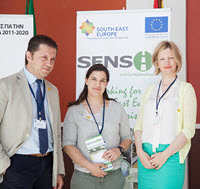
May 9, 2014 | Espanol news
La Comisión Europea, en cooperación con la Presidencia Griega de la Unión Europea, sirvió de sede para el Día Europeo de la Seguridad Vial realizado el 9 de mayo de 2014 en Atenas.
El vicepresidente Siim Kallas, Comisionado para el Transporte, indicó: “La UE tiene una trayectoria sobresaliente en seguridad vial a nivel mundial. Pero mientras siga habiendo accidentes mortales en nuestras vías, no podemos darnos el lujo de ser displicentes. Este año, es momento de centrar nuestra mirada en las vías y en la infraestructura. Ahora existe mayor potencial de convertir las vías de la UE en carreteras más seguras e inteligentes.”
Make Roads Safe Hellas participó en el evento y mostró el reciente progreso alcanzado con SENSOR, que congrega a 14 países enfocados en la evaluación e identificación de mejoras de ingeniería que permitan salvar vidas.
SENSOR se basa en la historia de éxito de la UE, la adopción de los principios de seguridad básicos para la gestión de la red transeuropea de transporte: inspecciones de seguridad, mapeo de los tramos de vías más peligrosos y evaluaciones del impacto de la seguridad antes de la construcción de las nuevas carreteras.

May 9, 2014 | News
The European Commission, in cooperation with the Greek EU Presidency, hosted European Road Safety Day in Athens on 9 May 2014.
Vice-President Siim Kallas, Commissioner for transport, said: “The EU has an outstanding road safety record in global comparison. But as long as there are fatal accidents on our roads, we cannot afford to be complacent. This year, it is time to look at the roads and the infrastructure. There is great potential in making EU roads both safer and smarter.”
Make Roads Safe Hellas participated in the event, illustrating recent progress made on SENSOR, which brings together 14 countries to assess roads and identify life-saving engineering improvements.
SENSOR builds on an EU success story, the adoption of basic safety principles for management of the trans-European road transport network: safety inspections, mapping of the most dangerous road stretches and safety impact assessments before the building of new roads.
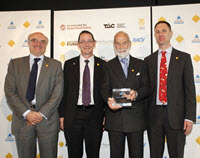
May 6, 2014 | Espanol news
El Premio Príncipe Michael reconoce los esfuerzos realizados por el iRAP por intensificar las acciones en seguridad de la infraestructura vial y enfrentar la epidemia mundial de lesiones causadas por accidentes de tránsito.
Más de 70 países han utilizado las herramientas del iRAP para evaluar sus vías y solo en países en desarrollo, las herramientas están siendo usadas en proyectos con un valor de más de US$7 mil millones.
El premio fue entregado durante el Foro de Donantes y Políticas de la Década de Acción realizado en Melbourne, Australia. Durante el foro, la Embajadora de la Seguridad Vial Mundial, Michelle Yeoh, solicitó la inclusión de la seguridad vial en las nuevas metas de desarrollo mundial y alentó a todos a votar por ‘mejores vías y sistemas de transporte’ en la Encuesta global “Mi Mundo” de las Naciones Unidas..

May 6, 2014 | News
The Prince Michael Award recognises iRAP’s efforts to scale-up action on road infrastructure safety and tackle the global epidemic of road traffic injuries.
More than 70 countries have made use of iRAP tools to assess their roads and in developing countries alone, the tools are being used in projects worth more than $7 billion.
The award was presented during the Decade of Action Policy and Donor Forum in Melbourne, Australia. During the Forum Global Road Safety Ambassador, Michelle Yeoh, appealed for the inclusion of road safety in new global development goals, encouraging everyone to vote for ‘better roads and transport’ in the UN’s global My World survey.
May 1, 2014 | Report, Resources
Download Click the file icon above to download the file. 2014 iRAP Briefing paper – Star Ratings for Sivile Primary School
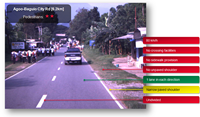
Feb 28, 2014 | Espanol news
Un viaje a la hermosa ‘Ciudad de los Pinos’ está por volverse más seguro gracias a las mejoras en seguridad vial que tiene planeado realizar el DPWH.
El camino que sube hasta la cima de la montaña es uno de los más pintorescos de la nación, pero también es escenario de numerosas colisiones viales graves. En julio de 2010, por ejemplo, la policía reportó que al menos 12 personas murieron y otras 39 resultaron heridas después de que el bus en el que viajaban colisionara contra un árbol en una curva.
Las mejoras planificadas incluyen límites de velocidad en zonas escolares, bermas pavimentadas, barreras de seguridad, veredas (aceras), cruces peatonales y nuevas demarcaciones y señales.
El proyecto de demostración es un resultado tangible de las evaluaciones del iRAP que se llevaron a cabo con el apoyo del Banco Mundial y Australian Aid.































